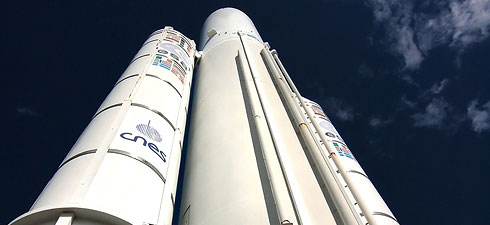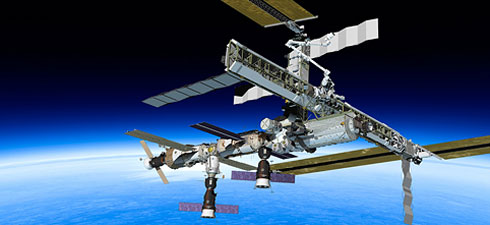For example Ariane V is one of the most reliable rockets so far. It conveys satellites into orbit and supplies the ISS with material by launching the Automated Transfer Vehicle. But despite numerous successful launches, they are anything but routine. "The biggest difference of space risk in comparison to conventional market segments might be the fact that you can actually watch your future loss live on television," says Thierry Colliot, Deputy General Manager at SpaceCo, an Allianz Global Corporate & Specialty subsidiary and leader in the space insurance market.
Covering space oddities
Space travels challenges on earth
In general, different perils of space travel are categorized in ground risks and in-orbit risks. Even before a launch, there are various factors which need to be considered. During their erection and operation, the various production sites and launch facilities are exposed to hazards such as natural catastrophes or fire. Great efforts have to be made by the experts to assure safe procedures, as handled objects are at least delicate or, like explosive devices, also dangerous.
Especially in commercial space missions, delays of a satellite's service are costly risks. Even when the launch is successfully finished, there are still risks of damage, malfunction or total loss during a spacecraft's operational life. After all, even the failure of a tiny piece of equipment can cause a total loss.
However, losing a spacecraft is by far not the only risk: potential interruptions of a satellite's service in our globalized world are just as problematic. This is a huge concern for spacecraft users, individual transponder users such as TV channels and Internet providers, but also for banks, car manufacturers and large industries that use telecommunication networks. Particularly in situations of tremendous public attention, for example during broadcasts like the soccer World Cup Final or the Olympic Games, a malfunction would prove disastrous for commercial revenue and the image of TV stations.

One regular mission of the carrier rocket is injecting satellites into orbit
Comprehensive approach
Considering the high technological level, the immense financial effort of space transport and the important role of satellites in the telecommunication sector, it is no surprise that its risks must be managed carefully. Space risk management is a very complex discipline. It combines contract analysis and advice, risk evaluation, modeling, insurance program design and implementation, alternative risk transfer concepts, as well as claim negotiation.
This meshes well with the integration of SpaceCo in the Allianz Group, which may be the only insurer able to provide the space industry with all lines of business such as Property and Casualty, Marine and Aviation, ART and dedicated space insurance. Therefore, insurers have to assure a high level of expertise.

Ariane V also delivers tools and materials to the ISS
Sophisticated expertise
It is not only the impressive images of space travel that make its risks unique. If an insured item in orbit is damaged, it is simply inaccessible. It is almost impossible to repair a satellite or to examine closely the reason it failed. In addition, potential losses are severe. There are about 20 to 30 commercial launches every year. While a big commercial satellite may cost anything between 300 to 600 million US dollars including its launch, the whole premium for space insurance was estimated at about 600 million US dollars in 2007. As Thierry Colliot puts it, "You can potentially lose the premium of a whole year in one single event."
Nevertheless Colliot is confident that SpaceCo will continue to play the prominent role it already occupies: "At SpaceCo, we have an authoritative technical approach. Our extensive experience combines expertise in the fields of telecommunication, launchers, insurance and finance. This is maybe the only approach that is so comprehensive.
"Though growth estimates vary considerably according to different studies, with ever growing information networks and new technologies such as HD TV and TV transmission to mobile phones emerging, the number of satellites launches is expected to grow considerably over the next few years. And of course, this will require even more sophisticated risk solutions in the future.
As with all content published on this site, these statements are subject to our Forward Looking Statement disclaimer.
Link to the disclaimer